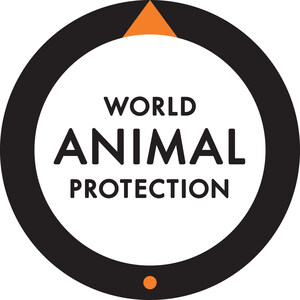TORONTO, June 24, 2015 /CNW/ - A new partnership between international charity World Animal Protection and adventure travel company World Expeditions sets a high standard for animal welfare in tourism.
World Expeditions has already won awards for environmental initiatives, responsible tourism and improving the living conditions of people in some of the most remote communities in the world. Last year, they removed all instances of elephant rides from their trips and that important change inspired them to do even more to protect animals.
Partnering with World Animal Protection, they have developed an Animal Welfare in Tourism Code of Conduct ensuring wild animals are only viewed in their natural habitats, requiring diligent research when evaluating visits to sanctuaries and preventing products made from animals (e.g. ivory and turtle shells) from becoming souvenirs. Together they have developed a list of quick tips for travellers and World Expeditions has committed to never include cruel activities such as posing with tigers or walking with lions in their itineraries.
"Many tourists who love animals are simply not aware of the hidden cruelties that go on behind the scenes at wild animal attractions and they unknowingly contribute to animal suffering when they participate in activities such as elephant rides or posing for a photo with a tiger," says Josey Kitson, Executive Director of World Animal Protection Canada. "By partnering with World Expeditions we can reach tourists and help local tour operators find alternatives that improve the lives of animals around the world."
"We believe that all animals should have a good life and that we have a duty to protect them. We are glad to have World Animal Protection's guidance on our code of conduct as we know that it is the best way to ensure that we improve the lives of animals everywhere we travel," says Donna Lawrence, Responsible Travel & Brand Manager for World Expeditions. "The code applies to our local operators, employees and our travellers. It sets a high standard for the treatment of animals across all possible encounters on our trips," she continues.
Notes to editors:
- High resolution photography and videos are available on request
- For further information and interviews with spokespeople please contact
Beth Sharpe [email protected] T: 1 416 369 0044
About wild animals in tourism:
From elephant rides to walking with lions, selfies with tigers to swimming with dolphins, wild animal attractions are currently part of too many holidays. Yet tourists are largely unaware of the cruelty that goes on behind the scenes. Tourists might think riding an elephant or walking with lions does no harm. But the brutal truth is that breaking these animals' spirits to the point where they allow humans to interact with them involves cruelty at every turn; snatching them from the wild; transporting them; keeping them in isolation and beating them to break their wills. Visit www.beforetheybook.org to learn more about how we can help end this cruel trade.
About World Animal Protection:
World Animal Protection, formerly known as the World Society for the Protection of Animals (WSPA), is active in more than 50 countries. From our offices around the world, we work with businesses, governments, local partners and animal welfare organizations. We help people to find practical ways to prevent animal suffering worldwide. We collaborate with national governments, and we have formal relationships with international bodies including the Food and Agriculture Organization of the United Nations, the United Nations Environment Programme, the Council of Europe and the World Organisation for Animal Health (OIE). We seek national and international policy change to improve the lives of millions of animals, because animal protection is a fundamental part of a sustainable future.
About World Expeditions:
World Expeditions is one of the world's leading adventure travel companies offering ground breaking itineraries on every continent. The company has been operating small group trekking and adventure travel holidays and vacations since 1975. We are widely recognized for ground breaking Responsible Tourism initiatives. In particular, the award winning Community Project Travel Program helps to improve the living conditions of some of the world's most remote communities. Today, with offices around the globe, we offer more than 500 standalone itineraries; small group active adventures and expeditions, cycling and walking tours and cultural journeys. Each itinerary has several scheduled departure dates throughout the season.
SOURCE World Animal Protection
Image with caption: "World Animal Protection and World Expeditions think wild animals belong in the wild, not in the tourism industry. © World Animal Protection (CNW Group/World Animal Protection)". Image available at: http://photos.newswire.ca/images/download/20150624_C9866_PHOTO_EN_43783.jpg



Share this article